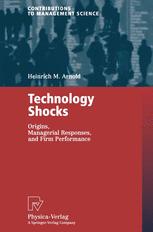

Most ebook files are in PDF format, so you can easily read them using various software such as Foxit Reader or directly on the Google Chrome browser.
Some ebook files are released by publishers in other formats such as .awz, .mobi, .epub, .fb2, etc. You may need to install specific software to read these formats on mobile/PC, such as Calibre.
Please read the tutorial at this link: https://ebookbell.com/faq
We offer FREE conversion to the popular formats you request; however, this may take some time. Therefore, right after payment, please email us, and we will try to provide the service as quickly as possible.
For some exceptional file formats or broken links (if any), please refrain from opening any disputes. Instead, email us first, and we will try to assist within a maximum of 6 hours.
EbookBell Team

5.0
90 reviewsRadical technological changes (so-called "technology shocks") frequently disrupt the competitive market structure. New entrants appear, industries need to be redefined, incumbents lose their positions or vanish completely. Fast moving industries - like the often quoted example of the semiconductor industry - have preferably been analyzed for these phenomena. But do the findings hold for industries with longer development cycles like the global machine tool industry?
Here, multivariate analysis is used to find out what management needs to focus on in order to lead companies through the technology shocks. The research for this book builds on in-depth interviews with 100 experts and decision makers from the machine tool industry involved in technology shocks and statistical analysis of detailed quantitative surveys collected from 58 companies. In several instances the results challenge classical teaching of technology management.
Adrian J. Slywotzky - US top selling business author and one of the most distinguished intellectual leaders in business - comments:
"In Technology Shocks, Heinrich Arnold develops a very useful model for analyzing technology shocks, and for focusing on those factors that will enable a company to navigate through these shocks successfully, and repeatedly. Although this work is focused on technology, its thinking has useful implications beyond technology shocks. It provides ideas that managers can use to protect their firms when they are faced with any type of discontinuity, technology-based or not".